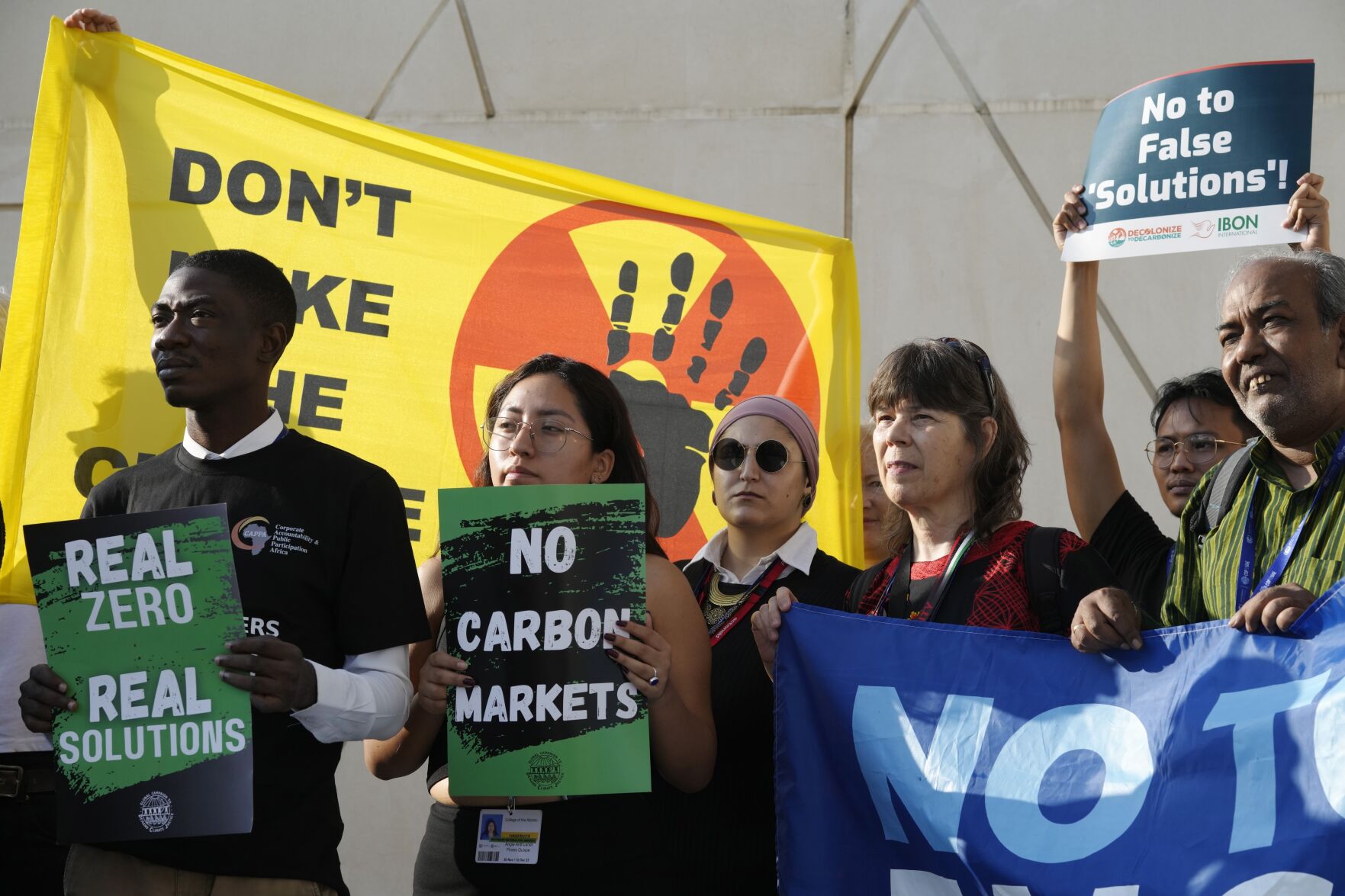DUBAI, United Arab Emirates — A large, long-shot effort is being developed to mobilize money to save Planet Earth.
Climate finance experts say trillions of dollars are needed for forestry projects and renewable energies like solar and wind in the developing world, all aimed at slashing pollution from the burning of oil, gas and coal, which cause climate change.
The price tag is eye-watering: Investment in energy-transition technologies were $1.3 trillion last year, according to the International Renewable Energy Agency, an intergovernmental group, and that needs to at least quadruple to avoid a level of warming that scientists say would be catastrophic.
Even rich governments can’t commit that kind of cash, and often struggle to get respective congresses and parliaments to even sign off on modest amounts.
Enter a plan to combine the cash-churning power of the private sector with carbon credits, a hot topic of discussion at the annual climate talks taking place in Dubai.
“It’s an enormous amount of capital to raise in a short time, so governments are going to have to be creative in terms of how they get there,” said Yousef Alhorr, founding chairman of the Global Carbon Council, an international carbon credit and sustainable development program based in oil-rich Qatar.
Carbon markets already exist and come with a good deal of baggage, so the plan has plenty of naysayers. Critics of the plan being developed say existing voluntary programs have been badly supervised — leading to cheating and rights abuses.
Proponents, like U.S. Climate Envoy John Kerry, lenders like the World Bank, and the U.N. acknowledge the markets have room for improvement. They say their plan would improve monitoring and provide greater cash churn.
Such voluntary schemes would resemble carbon offsets like those long offered by airlines to travelers, who willingly pay an extra fee to compensate for the carbon generated by their flights, often to fund tree-planting projects or protection of existing forests.
The markets would work like this: Countries that take part could generate carbon credits based on projects aimed to meet their own climate goals, such as protecting existing forests from development or shutting coal-fired plants.
Private-sector players could then buy the credits, which would allow them to emit a certain amount of carbon dioxide or other greenhouse gases. Heavy-polluting companies would be important customers.
Each credit would equal a ton of CO2 or the equivalent other greenhouse gases that can be reduced in the air, sequestered, or avoided by using green energies instead.
Money from the credits generated would go to local projects. The per-ton price of carbon would fluctuate in the market, meaning that the higher it rises, the more green projects could fetch through new credits generated.
In Dubai, the U.S. government along with the Bezos Earth Fund and the Rockefeller Foundation announced a project called the “Energy Transition Accelerator.” It aims to guide the plan by using “high-integrity” carbon crediting to weed out possible cheats and support local communities and populations.
Until now, accountability has been largely by independent registries of carbon markets. The ETA scheme would give governments a bigger role in ensuring that safeguards are built in.
Chile, Dominican Republic and Nigeria are pilot countries for the ETA, which aims to be established by Earth Day in April. Proponents estimate that $72 billion to $207 billion could be mobilized for transition to clean power projects by 2035.
It’s a voluntary program, and companies like Bank of America, Mastercard, Morgan Stanley, and PepsiCo have signed a letter of interest in participating.
In the past, companies participating in other carbon markets have made false claims about projects, known as greenwashing, and some financiers, farmers and others count a single project multiple times – meaning that the benefits are overestimated. Some corporate cheaters have cranked up emissions only to later reduce them and claim credits for going greener.
Critics say carbon credit programs let polluters keep polluting and have siphoned focus away from the most important goal — an end of use of fossil fuels, which is the No. 1 cause of global warming.
“Buying offsets from carbon markets without phasing out fossil fuels will always be greenwashing,” said Erika Lennon, senior attorney at the Climate & Energy at the Center for International Environmental Law.
Kerry admitted “some people abuse” carbon credit systems and “they have done an injustice to everybody.
“We believe it is more than cured in the approaches that we’ve put together,” he said during a Dec. 4 panel event at COP28, where he detailed the Energy Transition Accelerator.
Simon Steill, the executive director of the U.N. Framework Convention on Climate Change, cautioned against too much reliance on such programs. He said they “cannot substitute for government action” and should be coupled with “robust internal emissions cuts by the private sector.”
He called for new projects in agriculture, power storage, the retirement of fossil fuel assets, green hydrogen extracted through renewables, and electric mobility.
Still, it’s hard to imagine governments footing the bill for energy transition at a massive scale.
Ajay Banja, the president of the World Bank, said unifying a fragmented market to create bigger scale is needed. The Washington-based multilateral bank has devised its own carbon credit program, the Forest Carbon Partnership Facility.
In it, several countries including Guatemala, Vietnam and Congo plan over the next year to issue the first 24 million credits, and 11 other countries are lining up to join. The bank says the project hopes to get up to $2.5 billion through 2028.
“Ultimately, these credits have the potential to transfer billions of dollars to communities from companies and governments, voluntarily,” Banja told the panel event.
“This is hard, and we will be criticized: I’m pretty sure of that. We will make mistakes: I’m pretty sure of that,” he added. “But we will learn from them.”


